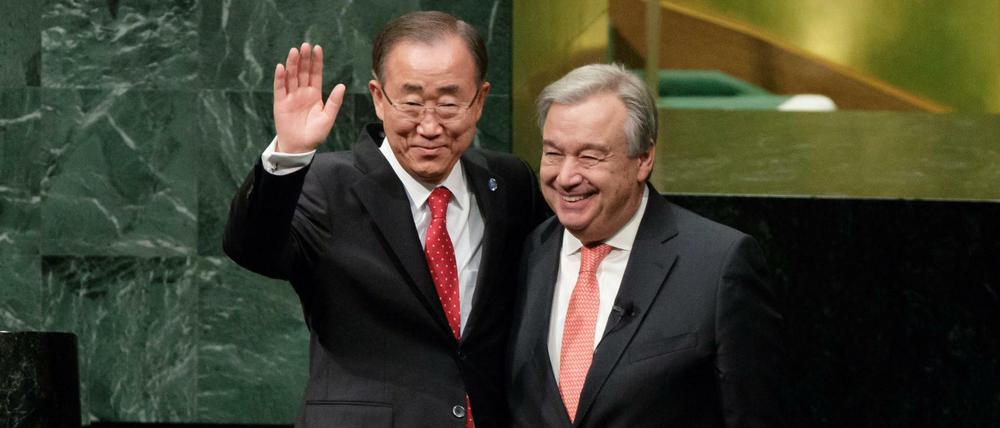
© Justin Lane/dpa
United Nations: What can the new United Nations Secretary General do to resolve the refugee “crisis”?
The UN members did not back António Guterres when he tried to lead the UN refugee organisation into the 21. century. He could manage that now a ne UN secretary general. A guest commentary.
Trump’s election has rather overshadowed last month’s selection of another international leader. On 1 January 2017 a new United Nations Secretary General took office. António Guterres brings over a decade of experience working in the UN and, as Prime Minister of Portugal from 1995 to 2002, he has a deep understanding of the pressures political leaders face. Samantha Power, the US Permanent Representative to the United Nations, called him a “supremely qualified candidate” and one “who has a passion for using this office to prevent conflict and alleviate human suffering”. The United Nations Security Council’s unanimous vote in favour of Guterres on October 5th was a surprise for two reasons. First, he is not an Eastern European, which had been expected due to an informal practice of regional rotation. Second, he is not a woman, and there was a strong campaign to elect a woman to the office for the first time and a number of extremely experienced and talented women candidates. So what type of leadership can we expect from Guterres, particularly on the critical issue global refugee and migration governance given that over 65 million people are currently displaced worldwide and the vast majority of refugees are hosted in the Global South.
Guterres was an ambitious, expansionist and politically astute High Commissioner for Refugees (UNHCR) from 2005 to 2015. Although the UNHCR has one of the narrowest mandates of all UN agencies – it was established to offer legal protection to refugees, defined as people fleeing persecution – Guterres saw a much broader role for it as the UN’s displacement organisation. He argued that the drivers of displacement were changing due to population growth, migration, urbanization, climate change, and food, water and energy insecurity. He argued that climate change “would unseat conflict as the main driver of mass migration in coming years,” and that the international community must develop new international frameworks to protect those it had displaced. Guterres sought to adapt UNHCR’s mandate to 21st century challenges.
The UNHCR had to keep it's narrow mandate
A leader of any international organisation needs to command state support for their vision, and states were extremely reluctant to expand UNHCR’s mandate. At a 2011 ministerial meeting they rejected Guterres’ call to offer protection to those falling outside the Refugee Convention. After all, most states fiercely guard their borders and are generally unwilling to open up new legal channels for migration or asylum. However, a small group of sympathetic states backed his call. Subsequently, in 2012 UNHCR worked with Norway and Switzerland (with German support) to establish the Nansen Initiative: a state-led, consultative process to identify solutions to cross-border displacement related to climate change. In October 2015 over 100 states gave broad support to better protect people displaced across borders by disasters and climate change. While there is still no clear mandate for UNHCR to offer this protection, by working in coalition with sympathetic states, Guterres and UNHCR advanced the conversation on displacement related to natural disasters.
Refugees and migrants to top the agenda
So what can Guterres do in his new role as UN Secretary General? There are three critical ways in which the United Nations can make a difference on refugees and migration. First, Guterres can make refugees and migration a priority issue for the UN, as Ban-Ki Moon did with climate change. Ban summoned states to global summits in New York on several occasions, and lobbied them to take strong actions to curb their emissions and forge a fair, binding international climate agreement. Guterres can seize on states’ willingness to discuss migration and refugees in the UN as they did in New York on 19 September. He could summon states to high-level summits and lobby them to commit to fairer distribution of refugees globally, and to protect vulnerable migrants who fall outside of the refugee convention. Second, Guterres can ensure that the UN’s development and humanitarian agencies are singing from the same song-sheet, rather than engaging in turf-wars, and all promote freedom of movement. As Guterres himself said, “Development cooperation policies must take much greater account of human mobility. Migration should be an option, not a necessity; out of hope, not despair.”
Moral leadership - with Merkel?
Finally, Guterres can use his position as the world’s moral leader and lead a global discussion with refugees, migrants, civil society and the private sector to illustrate the benefits for all societies of enabling migration and hosting refugees. This is particularly important in the aftermath of Donald Trump’s election in the US, the UK’s decision by referendum to leave the European Union, and the increasing popularity of the Alternative für Deutschland and other anti-immigrant, populist parties across Europe. Gueterres could well emulate Angela Merkel’s moral stance and turn her challenge to Trump to cooperate on the basis of shared values including respect for law and human dignity, into a challenge for the world.
Nina Hall is a Lecturer in Global Governance at the Hertie School of Governance, Berlin. She has a PhD in International Relations from the University of Oxford. She has researched and published on climate change and humanitarianism, global refugee and migration governance, climate adaptation financing, and leadership in international organisations. Her book Displacement, Development and Climate Change, International Organizations Moving Beyond their Mandates was published by Routledge (2016). She has also published in Global Environmental Politics and Global Governance and in newspapers such as the Guardian.
Nina Hall
- showPaywall:
- false
- isSubscriber:
- false
- isPaid:
- showPaywallPiano:
- false